
As technology continues to make its mark in every sector, the legal sector is no other exception. From pen and papers to scrolling through legal apps, the legal sector has changed a lot.
The legal industry has been radically transformed in the past decade. Traditional legal processes, which were once time-consuming and paper-based, have now become digitized. For example cloud-based platforms have been introduced. Also electronic filing systems has been implemented and AI-powered legal tools got deployed.
The evolution of legal sector
The application of technology such as Predictable Artificial Intelligence (AI) accuracy rates within the law has been improved. Also it has helped to reduce common mistakes made by humans and also enhancing access to legal materials. Even smaller law firms and independent practitioners can now utilize sophisticated tools for improved efficiency as legal technology becomes more user-friendly and cheaper. All thanks to legal apps!
Here are some of the most used legal apps.
CamScanner: This legal app uses your mobile camera to generate PDF documents which you can then annotate and upload on the go.
Fastcaseg: Fastcase can provide you with the on-the-go legal research you need.
Depose: Designed to keep track of the question-and-answer format that depositions fall into
Impact of legal apps among users
Looking at the current situation, legal apps in India are the latest trends everyone wants . As reported by Statista, the impact of legal tech on the global economy can rise to over 225 billion US dollars by 2027. But let's not forget that without any experienced lawyers, they're just fancy apps.
Legal apps can offer instant legal counsel such as case tracking document review or even AI supported contract analysis. Eventually, making it possible for any ordinary person to enjoy instant legal services. They not only save a lot of time but also help you to deal with complex matters legally with ease. In the legal ecosystem, these apps have closed a major gap. “For public users, these apps enable them to quickly access information about their legal rights as well as do-it-yourself (DIY) legal documents or have virtual consultations with lawyers online,” Saif Ahmad, founder, Luhaif Digitech, explained.

The future of legal tech
Looking ahead, compliance checks and real-time updates on cases, legal research have seen attorneys become dependent on such apps. This not only improves productivity levels but also client satisfaction. “Legal research using predictive analytics will keep on changing so that lawyers can make better strategic decisions. Blockchain-based smart contracts could change the way agreements are executed and enforced, eliminating intermediaries,” Manish Tewari, co-founder, Spydra Technologies, said.
While technology certainly streamline processes, they can't replace the nuanced understanding and strategic thinking that experienced human lawyers bring to the table. “Technology has certainly made information more accessible but the wisdom to interpret and apply it still resides with human lawyers. Just like a GPS navigation app can't replace the experience of a seasoned driver, legal apps can't substitute the expertise of a qualified lawyer,” Advocate & Counsel, Bombay High Court, highlighted.
The Legal sector is witnessing a transformative shift in the way work is executed. “In today’s contemporary scenario, legal sector is fast adopting promising AI legal tools. .AI technology has been found to contribute successful in settling petty disputes and traffic challan cases,” Sunil Kumar, Head of Department, School of Law, Lovely Professional University, concluded.